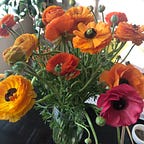Loud Work
12.1.2020
There’s quiet work, and then there is loud work.
For the first time in my medical career, I feel hopeful seeing our community do the loud work of health justice.
Young people, Black people, intersectionally marginalized people and their neighbors protested peacefully, fought to disarm the police in the middle of a global health crisis. It felt like protestors partnered with pediatricians and public health specialists in their age old, daily fight for health justice.
I remain hopeful that #WhiteCoatsForBlackLives is not just a hashtag, but is rather a public recognition of the deep, interconnected relationship between health justice, social mobility, and reconciliation. I am hopeful that today’s unrest will translate to safety for children in Black communities. I hope this fight manifests in sustained civic engagement vote in health policy that puts children first.
For pediatricians, especially those working outside of academia in community health clinics, police brutality is not new. Community health pediatricians bear witness to daily, systemic injustice and they fight it daily. They heal. They listen. They cry and shed tears with Black mothers, foster mothers, adopted aunties, and grandmothers. They navigate incarceration and its impact on families. Every day. They heal individuals, even when the volume of injustice in the community is overwhelming.
When I was a community health provider, no one was protesting. I had imagined a frontline career in health justice and policy. I felt guilty about quietly working in clinic, doing what felt like damage control in a system that systematically hurt the poor and people of color. I saw 20 to 30 patients a day to keep our doors open. It is not an exaggeration to say that every single patient I saw had poor health due to systemic discrimination. We had no time for primary prevention. Our business was damage control for humans.
Before I joined an academic faculty, I probably saw between 3500 to 5000 kids per year in this clinic. All were Black, Brown, poor White, and many were disabled. Diseases that are not normal and that are, in fact, due to injustice became routine to me. The worst asthma. The worst obesity. Scabies. Nearly every Latinx and Native American child I saw had fatty liver, and their liver health was the least concerning problem on the problem list. I made referrals to the emergency room for neurosurgery for orbital fractures at the hands of police. These children came to our clinic because they trusted us. Splints and orthopedics and hand surgery referrals for fractures- small hands twisted by the violent hands of police. Transgender teens arrested, jailed, sent home, and re-arrested for walking while trans. Child abuse report and after child abuse report after child abuse report. BMI over 45, always in Black children and never in White children. Obesity due to rape. Speech delay, hearing loss from antibiotics in the Neonatal Intensive Care Unit, motor delay, fine motor delay, autism, ADHD, ODD, PTSD, anxiety, suicidality. When I moonlighted in a very different zip code north of the freeway, I saw none of these problems.
I fought, as much as I could, in each of these encounters and so did every member of my staff. We were all dedicated to the quiet work of change and healing for individuals. We did our best.
I have fought outside of clinic too, but never felt I could achieve sustainable change. As a volunteer, the first patient I cared for was a Black man who died from a gunshot wound to the head, either from a neighbor or the hands of a cop, depending on who gave the history. I cleaned the blood off his gurney and told his mother I was sorry as she cried on the bathroom floor of the county hospital. As a pre-med student, I taught English and Biology in a public school Saturday program to improve diverse enrollment in health professions. As a medical student, I protested in my short white coat, made calls to Congress, begged for justice from leadership. Did an internship in DC. Collaborated with Black barbers to reduce hypertension and improve trust with medical providers- mistrust due to decades of systemic discrimination.
As a public health intern, I worked in the County Jail on infection control and prisoner health rights. As a resident, I provided access to those whose zip codes and insurance status discriminated against seeing a faculty physician. I chose a Federally Qualified Health Center for my continuity clinic. I treated disparities that started in the womb. Disproportionately Black preterm birth, domestic violence, HIV, chlamydia, complications of prematurity, eclampsia, non-breastfeeding, infant mortality, perinatal mortality. As a fellow, I observed my attendings fight against Black death on the organ allocation waitlist.
None of this was enough.
As faculty, I treat kids with chronic, complex illness at a large, academic medical center. My patients are disproportionately disabled, with complications resulting from prematurity. Many who do not adapt come from disadvantaged, under privileged backgrounds. I often kneel, bearing witness and grieving with families facing systemic oppression.
I am grateful for every single person doing loud work today in the streets, in city hall, in the legislature and courts. I am grateful for those who continue to do quiet work, in ICUs, in community health centers, in academic and community medicine. Never have we had this kind of momentum to change policies, to reduce systemic discrimination, and to fight for health justice. We have a tremendous responsibility and opportunity put the lives of every kid first. We will not give up.
